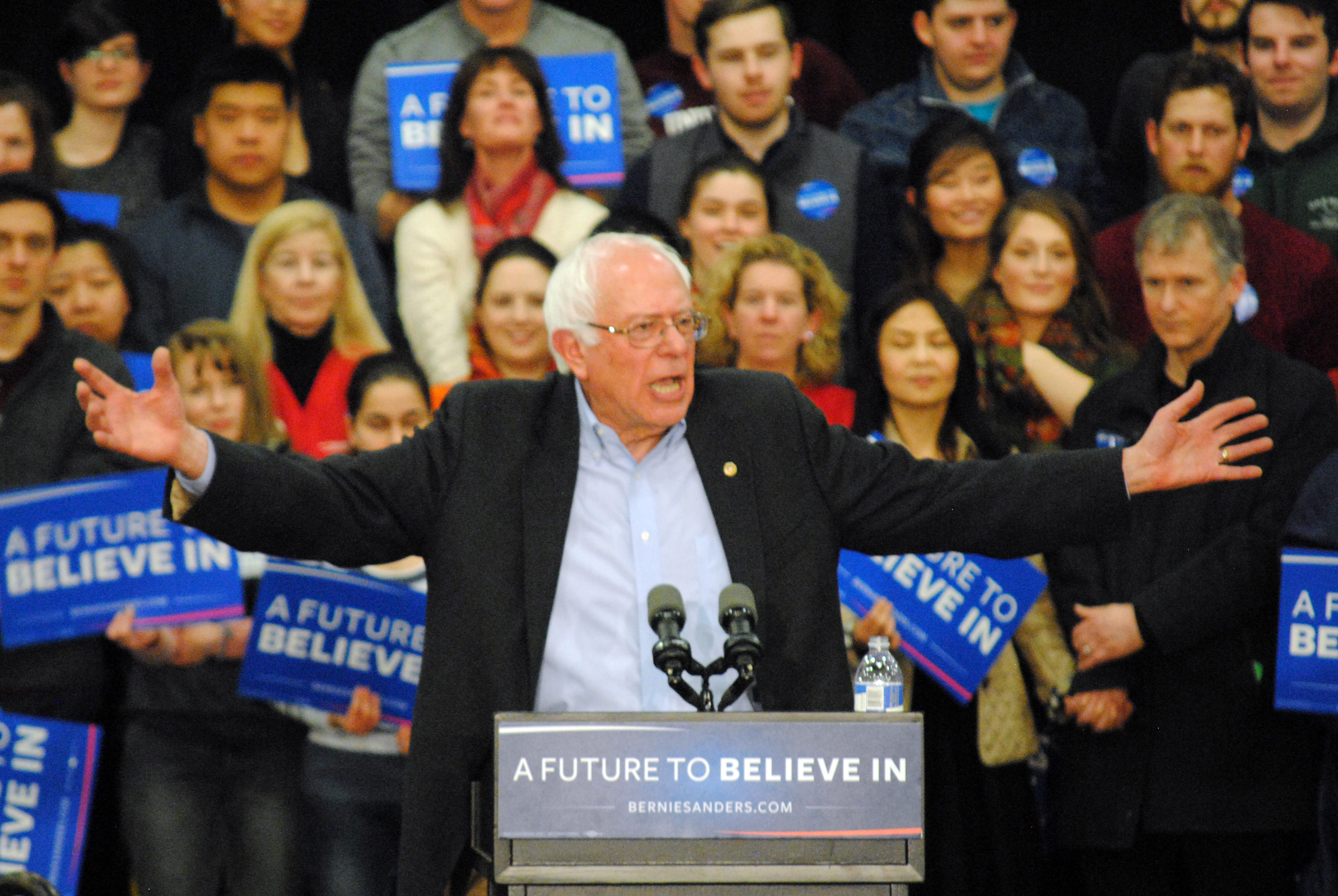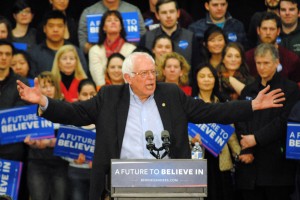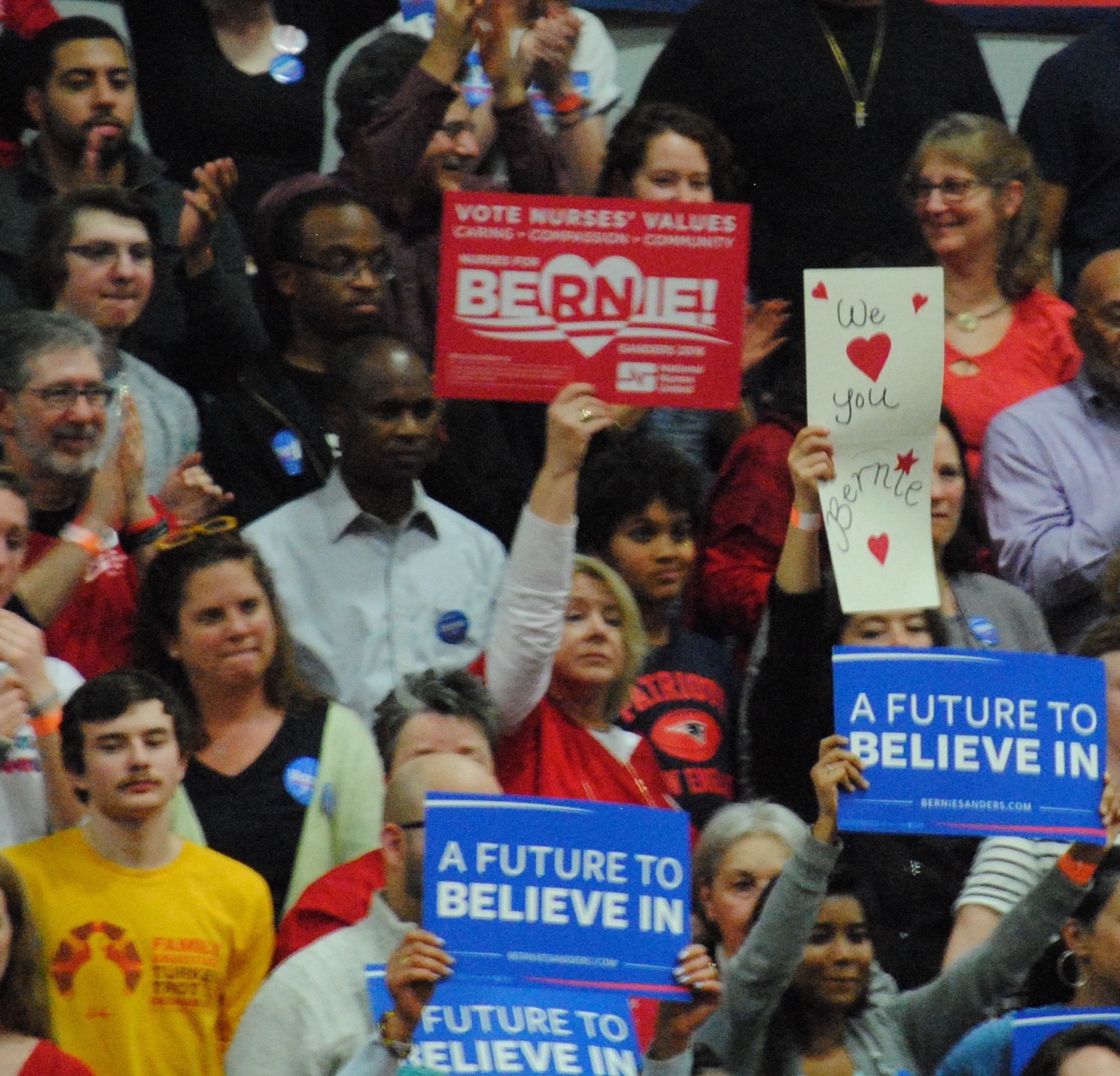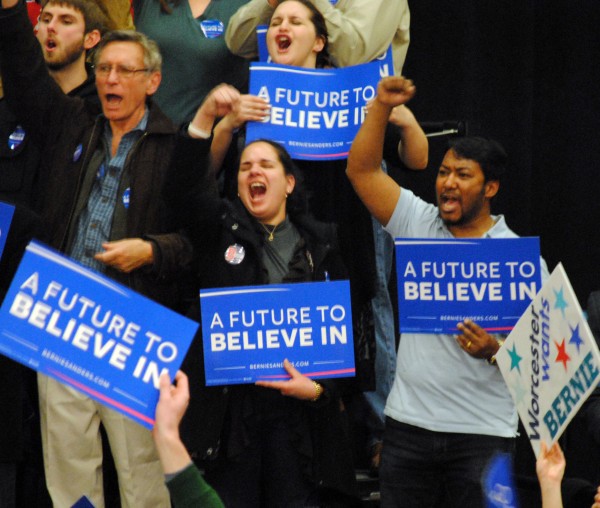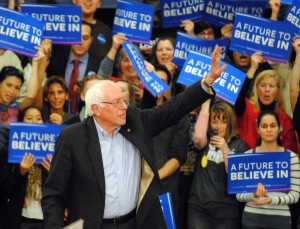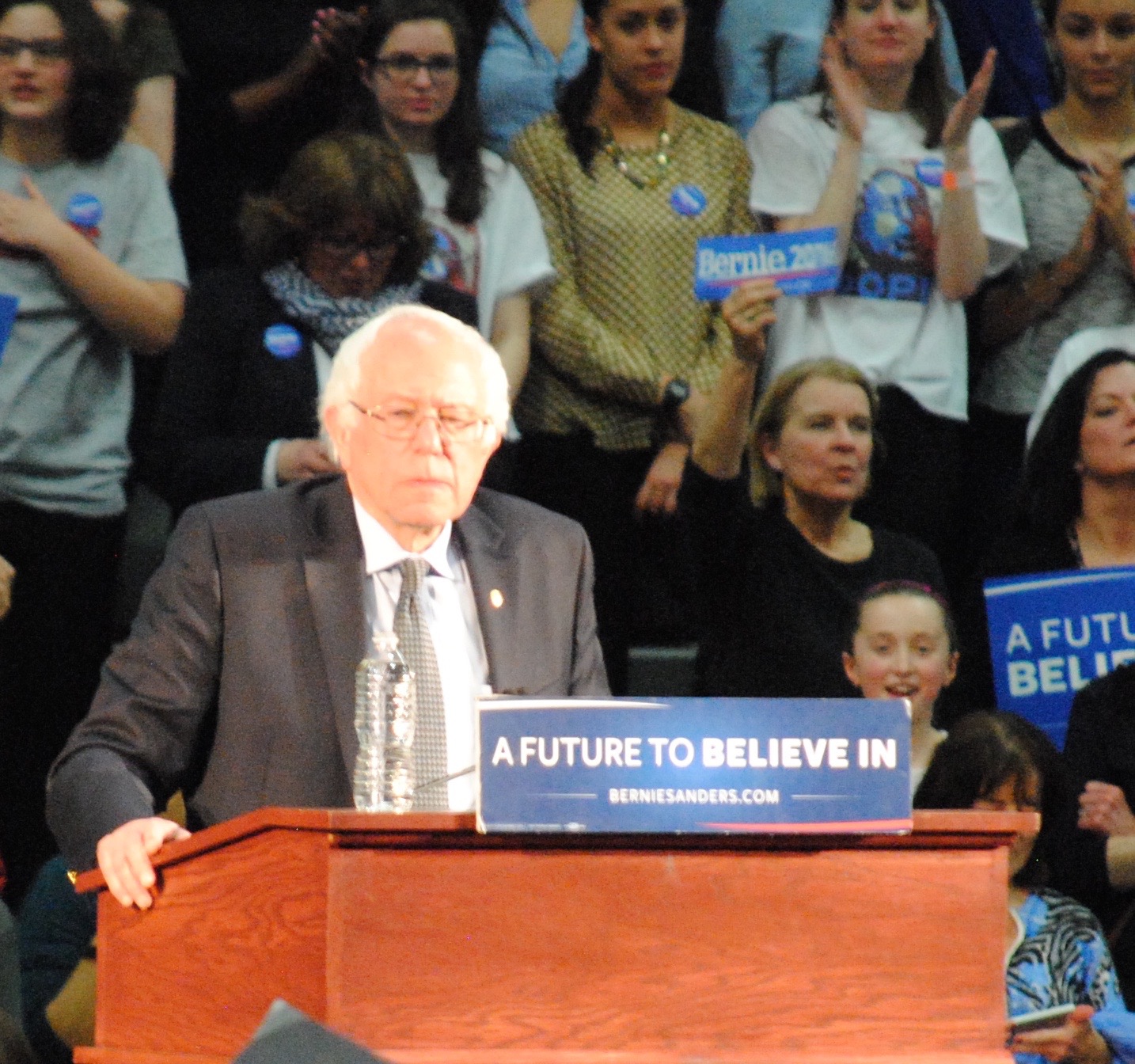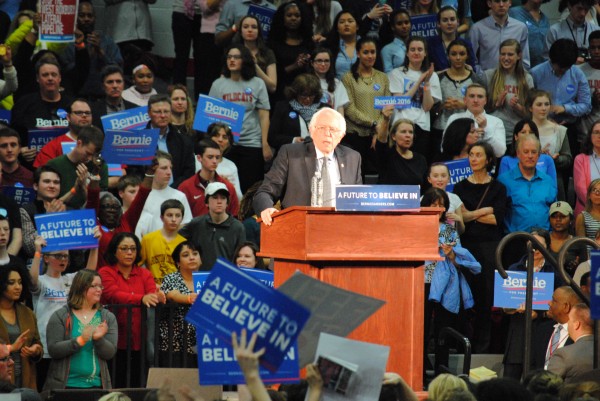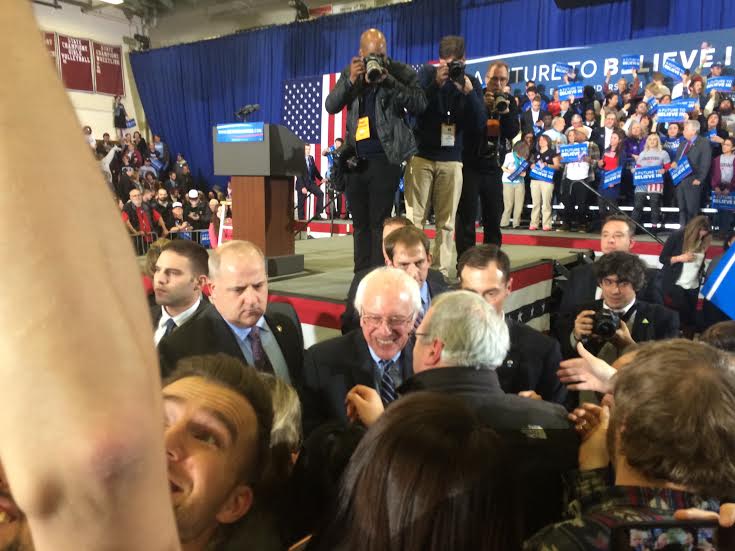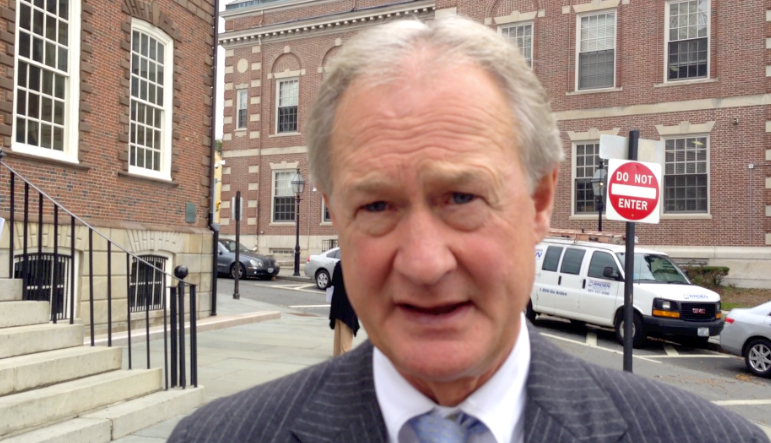 It was a cold night in Concord, probably 15 degrees with a light, damp breeze that numbed my fingers and toes, my nose, then my legs. I was running in place to keep warm. South Kingstown Town Council President Abel Collins and I had been waiting for an hour outside of a local high school, where Bernie Sanders was to give his speech after the New Hampshire presidential primary elections.
It was a cold night in Concord, probably 15 degrees with a light, damp breeze that numbed my fingers and toes, my nose, then my legs. I was running in place to keep warm. South Kingstown Town Council President Abel Collins and I had been waiting for an hour outside of a local high school, where Bernie Sanders was to give his speech after the New Hampshire presidential primary elections.
While a few dozen supporters waited outside of the main entrance, ticket holders slipped through the crowd and into the warmth and light of the school, where they passed through metal detectors and faced pat-downs by the Secret Service. From the frigid dark outside, we could see through the large cafeteria windows, ringed with steam and frost, where the national media gathered with their laptops, and a big screen projected the live feeds of CNN, MSNBC, CBS, and FOX.
Despite the cold, everyone outside was ecstatic that Bernie was approaching victory.
However, it still felt jilting to be stuck out in the cold after we’d spent a day canvassing for Sanders, and nobody knew how to get tickets. Young campaigners, frustrated at being locked out of the rally, decried the campaign as readily as they supported it earlier in the day, but I knew better. Abel suggested that certain donors probably got tickets, and I realized that fire codes would prevent a large raucous crowd from entering the school at will. The frustrated supporters gradually trickled back to their cars as the temperature continued to fall, and I watched a middle-aged woman storm away from the school after tossing her white “Bernie 2016” sign to the salty, icy concrete. I picked it up before it could get wet—my first piece of Sanders campaign swag. The next day, we found out that the Secret Service had used tickets as a crowd control measure.
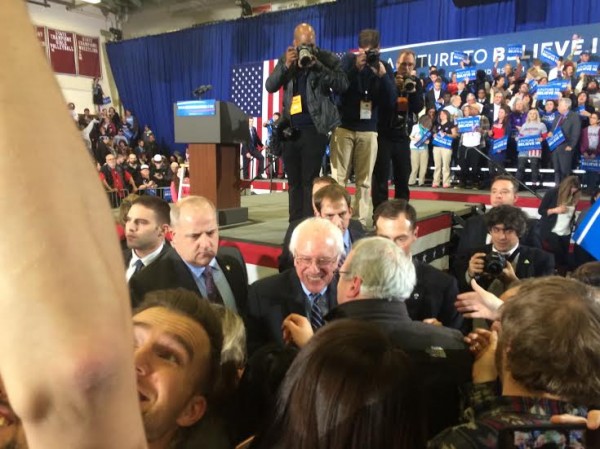 Abel and I had just spoken to three different reporters, two of whom work for our local TV news in Rhode Island and one for Scientific American. We told them that we came to New Hampshire to help out and take part in a movement, even though we couldn’t vote here. We had spent the day knocking on doors in Hudson, an effort coordinated by local volunteers, and we told the reporters that the incredible energy and organized efforts of the volunteers we worked with made us want to return to our home state and help support Sanders.
Abel and I had just spoken to three different reporters, two of whom work for our local TV news in Rhode Island and one for Scientific American. We told them that we came to New Hampshire to help out and take part in a movement, even though we couldn’t vote here. We had spent the day knocking on doors in Hudson, an effort coordinated by local volunteers, and we told the reporters that the incredible energy and organized efforts of the volunteers we worked with made us want to return to our home state and help support Sanders.
We told them that it was inspiring to see so many different kinds of people working together to build a political revolution. In Hudson, our canvassing activity centered around a “mothership” of a single-family home in a quiet neighborhood that devoted their entire first floor and garage to campaign work. Teenage kids sat around with laptops and headsets, making calls to voters and supporters. Older men and women scanned through sheaves of paper to consolidate the data gleaned from the rounds of canvassing while younger folks, like me, hit the streets to knock on doors.
Jim led training sessions in the garage for each new batch of canvassers. Howard, a veteran 10-month campaigner who sported a white “Bernie 2016” shirt and a black peacoat bedecked with blue and white Bernie buttons, told us his story and how far the campaign had come in such a short time. All told, I probably saw fifty different people come and go from that house on that cold and sunny Tuesday, and everyone buzzed with nervous energy at the possibility of Sanders’s first campaign victory after the “virtual tie” in Iowa.
I told the reporters that that was just one house of supporters—a house that had the energy and organization of an official campaign office. Imagine how many other well-organized volunteers are out there, doing the work needed for Sanders to succeed.
We made the eleven o’clock news that night on Rhode Island affiliates of NBC and FOX. They reported that we were shut out in the cold outside of Concord High School, where Sanders would deliver his victory speech after a landslide victory over Hillary Clinton, but I had a feeling that if we waited, they’d probably let us in. After an hour and a half of shivering and wiping our running noses, they did, and there was a bum rush for the doors.
Those of us who waited grinned with satisfaction, eager to get inside not just to see Bernie, but to be out of the frigid night. After passing through security, we entered the packed, brightly lit gymnasium where grandstands of supporters waved blue and white placards that read “A Future to Believe In,” the same slogan that hung on a banner behind the stage. A whole bleacher full of reporters and camera crews and garish lighting stood directly opposite the stage, and I recognized Sanders’s campaign manager while he gave an interview to CNN. I had never been so close to the national media before, and their presence added to the bright energy that streaked through the room. I was so happy to finally get a chance to see Bernie speak, but to be part of such an electrified and inspired crowd made me feel politically empowered for the first time in years.
A large screen hung over the crowd, and we watched live coverage of the election. When CNN called the election in favor of Sanders after a nearly 60-40 split with 70 percent of precincts reporting, the crowd erupted in cheers. And when Bernie came out for his speech, people clapped and stamped and jumped up and down, waving those rally signs in a blue wave of thunderous celebration as he raised his arms in victory and waved to the crowd. Chants broke out: “Ber-NIE! Ber-NIE!”; “We don’t need to Super PACs, Bernie Sanders got our backs!”; and the most popular, “Feel the Bern! Feel the Bern!” Every time he said “huge,” we all yelled “yuuuuuuge!” And during his speech, we took every opportunity to cheer the candidate that had finally found the pulsing vein of progressive, populist, working-class voters who grew tired and frustrated with established politicians that serve special interests and party concerns instead of their electorates. We took every opportunity to feel the energy, the Bern, that jolted through the crowd, and we felt like we were part of the movement, part of a potential revolution.
Cusp millennials feel the Bern too
I’m 29, a cusp millennial, and in my 11 years of voting and my fifteen or so years of political awareness, I had never felt anything as empowering as this rally. I had never been part of a presidential campaign before—I had mostly supported and worked for Abel, who once ran for Congress and now serves as the town council president in South Kingstown, RI. I always read the news and pried my way through different analyses and opinions to learn the truth as well as I could so that I could vote accordingly. I even developed my tendency toward progressive politics before I was old enough to vote because I grew up with George W. Bush as president for nearly all of my adolescence. And when I became old enough to vote, I relished the opportunity to vote against him.
It felt real good to cast that first vote. It felt real good to cast the second for Barack Obama when he took the presidency. But that soon became a problem for me, as I didn’t see the ethical merit in voting for a Democratic Party candidate just so a Republican Party candidate wouldn’t be elected as president. It felt like negative, dark energy—a vote cast merely to prevent the opposition from victory, not a vote cast to ensure the victory of the candidate I truly believe in.
Of course, I voted for John Kerry and Obama in 2004 and 2008, respectively, but once I discovered that not only did those politicians serve their party’s interests (influenced by donors) instead of their voters, but that they also continued many controversial policies borne from the Bush administration (i.e. drone warfare and other military actions and policies) and abdicated their leftward promises for centrist policies, I became politically apathetic. I began to vote for third-party presidential candidates such as Jill Stein, the Green Party candidate in 2012, because instead of voting against the opposition, I intentionally voted for politicians who actually represented the kind of governance and policies that I hoped to see. It was also my act of protest against the two-party system.
During all of this time, I followed Senator Bernie Sanders. After studying his voting record—a successful civil rights progressive who is not, and never was, beholden to special interests—and after watching many of his speeches on the Senate floor, I began to believe that he was the only Washington politician that I can actually trust. Unlike most in Congress, Sanders was honest and had integrity. Senator Elizabeth Warren soon joined Sanders in my trust when she joined Congress. But I also understood that he, and Warren, were lone progressives in Congress and that most of their colleagues did not support the progressive legislation that they put forth, at least not publicly. I knew that Congress was so gridlocked along party lines that even the most useful and necessary legislation, such as the federal budget, either faced dismissal or indefinite delay and argument.
But I knew that Sanders and Warren were still in there, fighting the good fight and raising awareness to dire issues such as the reality and danger of climate change, the disenfranchisement that voters face from unethical campaign spending, the economic perils of banks that are “too big to fail,” the potentially lifelong burden of massive student debt, and the necessity of universal health care. I took heart in the fact that somebody was doing something, even if futile, about the most important issues that we face as a nation.
But after years of Congressional gridlock and stall, I became more and more apathetic, and soon I began to stop following any politicians, even Bernie.
Bernie can win, and should
It wasn’t until Sanders announced his candidacy for president that I started paying attention again. I didn’t actually contribute in any way, but I started talking to friends more and more about the election in 2016. Once Sanders gained traction and picked up in the polls, those conversations became more and more hopeful and serious about the idea of a Sanders presidency—one that represented the people, not the party and its donors. Soon, my parents and my friends’ parents, all middle-aged, started asking me about Sanders, even if they didn’t believe he could win or didn’t necessarily support his progressive politics. And once the Democratic leadership attempted to permanently cut off Sanders’s campaign from their voter information files (data which became useful and absolutely necessary to me and others as canvassers), I knew that I wanted to get involved again, and my arguments for Sanders grew more passionate and detailed.
I told them what I knew about his voting record and about the progressive policies he supports. I told them about his history as a civil rights activist. I told them how I thought he was a candidate of integrity that refused to play the games that Washington politicians play—that he chose to serve his constituents first. Most often, these arguments for Sanders were met with dismissal, their counter-argument being that Sanders couldn’t get elected, even though he represents the kind of progress that many voters want to see in government, including voters from my parents’ generation. They argued that he was “unelectable” as a septuagenarian Jewish guy from Brooklyn who is a self-proclaimed democratic socialist. They argued, almost always, that we should just support Hillary Clinton because we can’t let the Republicans get the presidency, especially not with Donald Trump as the GOP front-runner.
I chafed at those ideas, and I told them that we, as an electorate, have been faced with a pair of bad choices in every presidential election in recent history, and that we’ve often chosen the candidate that is the “lesser of two evils.” I told them that that, to me, is a defeatist viewpoint that surrenders all individual political power, and that to do so feeds the prevalence of negative campaigns and stokes the idea that we should simply vote against the opposition, which is essentially a pessimistic position to take. And I told them that, because of Sanders’s candidacy, we now have a more positive, optimistic choice for a Democratic candidate for president. I told them that Clinton’s policies are an echo of her husband’s, whose economic policies have often exploited people of color across the world and whose support of the “three strikes” rule led to the mass incarceration of black men in America, and her tendency toward favoring militaristic intervention abroad is simply not a pragmatic position to take in a time where we are faced with massive unrest in the Middle East, especially with a fatigued American military that has been at war for nearly fifteen years. I told them that Clinton often adjusts her politics to suit the political climate and times, especially on progressive issues such as gay marriage, whereas Sanders has been fighting for the same progressive policies for decades. I even told them that he once marched with Dr. Martin Luther King, even if that fact is purely symbolic of Sanders’s commitment to civil rights.
However, it also occurred to me that we of the Sanders campaign, unlike any other campaign in recent history, are actively proving that through an internet-supported grassroots campaign fueled by small individual donations, his candidacy, and by virtue his movement, our movement, can prove that a healthy democracy is possible in this America. Our movement can prove that the established rules of the nomination process serve the major parties and their wealthy donors, not everyday voters. Our movement can prove that the process of giving power to appointed superdelegates–those unelected party officials and politicians who have preemptively pledged their votes to nominate Clinton–diminishes the importance and value of a single vote, which is a value that is constantly and hypocritically emphasized by establishment politicians. Our movement, through sheer numbers, can prove at last that we can take control of our government and pressure our government to serve the people first. And if our movement fails, we will at least have tried—because why not try to guarantee a better future than any other candidate or campaign can offer?
If Sanders maintains the momentum and energy that his campaign sparked in New Hampshire, the energy that Abel and I contributed to and felt a part of, then Sanders can win. Clinton represents a centrist status quo, one that implies that to fight for progressive ideals is pie-in-the-sky and not worth fighting for, while Sanders represents a dynamic change in government to serve the people first. The newest voting bloc—young voters like myself—is likely to side with Sanders, and, in New Hampshire, he took every demographic except for older wealthy people. Voters age 18-24, a demographic that is gaining power and will become the future leaders of our country, supported Sanders over Clinton nearly 9 to 1. Those erstwhile Clinton supporters of all demographics are beginning to see the error in Clinton’s ways and are beginning to trickle over to Sanders’s side.
After Bernie’s electrifying speech in which he said the word “we” more than any other word—he always termed it “our candidacy,” an incredibly empowering piece of oratory—Abel and I weaved our way out of the packed gymnasium. I ran into a Sanders field organizer that I met in Hudson, a young man from Kansas who has traveled all over the country working to get Sanders elected, and we high-fived and hugged, ecstatic at the win. I didn’t even get his name, but I got his energy, a positive energy that is contagious. We wished each other good luck and said that we hoped to cross paths again on the campaign trail—a trail that I hope to follow, as a volunteer for Sanders, to victory. And as Abel and I walked out into the cold quiet New Hampshire night, we could hear the people at Concord High School chanting, “This is what democracy looks like!”
Christopher Dollard is a Bernie Sanders campaign volunteer who holds an MFA in Creative Writing from Syracuse University. He writes poetry and nonfiction. For volunteer opportunities, you can contact him at cjdollard@gmail.com.
 The candidacy of Donald Trump, somewhat despite and somewhat because of his ridiculous mugging and antics, strikes me as one of the greatest cartoons presented to the American public in some time. Perhaps this is due to my own Oscar the Grouch skepticism as an 85-year-old woman trapped in the prison of a 30-year-old man’s body, complete with an attraction to Billie Holiday and Douglas Fairbanks and disgust at any music produced in this century, but I think this man is a fascinating and very public example of the ruling class getting exactly what they asked for.
The candidacy of Donald Trump, somewhat despite and somewhat because of his ridiculous mugging and antics, strikes me as one of the greatest cartoons presented to the American public in some time. Perhaps this is due to my own Oscar the Grouch skepticism as an 85-year-old woman trapped in the prison of a 30-year-old man’s body, complete with an attraction to Billie Holiday and Douglas Fairbanks and disgust at any music produced in this century, but I think this man is a fascinating and very public example of the ruling class getting exactly what they asked for.


